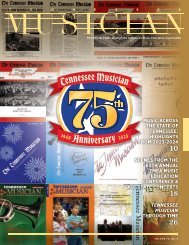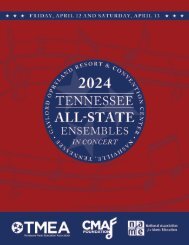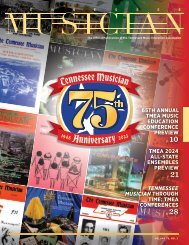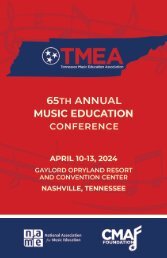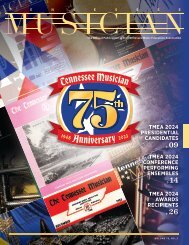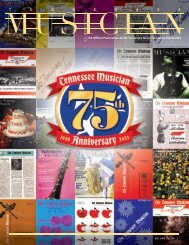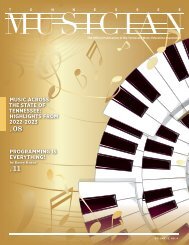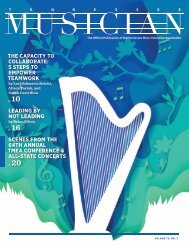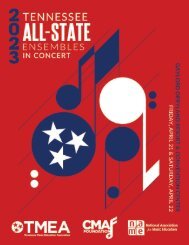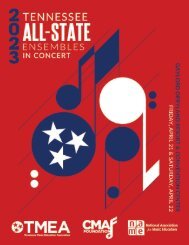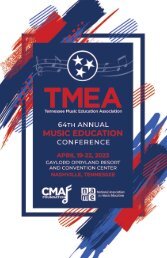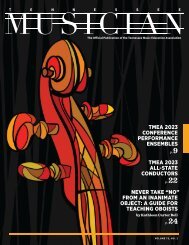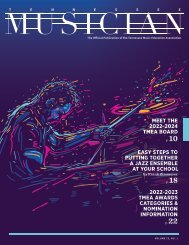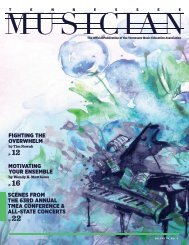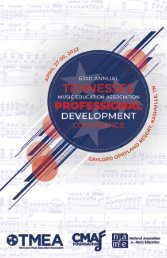Create successful ePaper yourself
Turn your PDF publications into a flip-book with our unique Google optimized e-Paper software.
The Official Publication of the Tennessee Music Education Association<br />
Expanding the<br />
Vision of Self:<br />
Why the Arts<br />
Matter<br />
by Linda F. Nathan<br />
p. 16<br />
Music Literacy<br />
Techniques<br />
for Teaching<br />
Successful<br />
Sight-Reading<br />
by Carol King-Chipman<br />
p. 24<br />
VOLUME <strong>69</strong>, NO. 2
䴀 唀 匀 䤀 䌀<br />
䄀 䌀 栀 爀 椀 猀 琀 ⴀ 挀 攀 渀 琀 攀 爀 攀 搀 甀 渀 椀 瘀 攀 爀 猀 椀 琀 礀 椀 渀 猀 漀 甀 琀 栀 攀 愀 猀 琀 吀 攀 渀 渀 攀 猀 猀 攀 攀<br />
眀 椀 琀 栀 昀 愀 挀 甀 氀 琀 礀 Ⰰ 挀 甀 爀 爀 椀 挀 甀 氀 甀 洀 Ⰰ 昀 愀 挀 椀 氀 椀 琀 椀 攀 猀 Ⰰ 愀 渀 搀 漀 瀀 瀀 漀 爀 琀 甀 渀 椀 琀 椀 攀 猀<br />
琀 漀 瀀 爀 攀 瀀 愀 爀 攀 礀 漀 甀 昀 漀 爀 礀 漀 甀 爀 最 漀 愀 氀 猀 愀 猀 琀 漀 洀 漀 爀 爀 漀 眀 ᤠ 猀 洀 甀 猀 椀 挀 椀 愀 渀 ⸀<br />
唀 一 䐀 䔀 刀 䜀 刀 䄀 䐀 唀 䄀 吀 䔀 䐀 䔀 䜀 刀 䔀 䔀 匀<br />
䈀 愀 挀 栀 攀 氀 漀 爀 漀 昀 䄀 爀 琀 猀 椀 渀 䴀 甀 猀 椀 挀 ∠ 䈀 愀 挀 栀 攀 氀 漀 爀 漀 昀 䴀 甀 猀 椀 挀 䔀 搀 甀 挀 愀 琀 椀 漀 渀 ∠ 䈀 愀 挀 栀 攀 氀 漀 爀 漀 昀 䴀 甀 猀 椀 挀 椀 渀 倀 攀 爀 昀 漀 爀 洀 愀 渀 挀 攀<br />
䈀 愀 挀 栀 攀 氀 漀 爀 漀 昀 䴀 甀 猀 椀 挀 椀 渀 䌀 栀 甀 爀 挀 栀 䴀 甀 猀 椀 挀 ∠ 䈀 愀 挀 栀 攀 氀 漀 爀 漀 昀 匀 挀 椀 攀 渀 挀 攀 ⴀ 䴀 甀 猀 椀 挀 䈀 甀 猀 椀 渀 攀 猀 猀<br />
䜀 刀 䄀 䐀 唀 䄀 吀 䔀 䐀 䔀 䜀 刀 䔀 䔀 匀<br />
䴀 愀 猀 琀 攀 爀 漀 昀 䴀 甀 猀 椀 挀 ⴀ 䔀 搀 甀 挀 愀 琀 椀 漀 渀 ∠ 䴀 愀 猀 琀 攀 爀 漀 昀 䴀 甀 猀 椀 挀 ⴀ 倀 攀 爀 昀 漀 爀 洀 愀 渀 挀 攀<br />
䴀 愀 猀 琀 攀 爀 漀 昀 䴀 甀 猀 椀 挀 ⴀ 䌀 漀 渀 搀 甀 挀 琀 椀 渀 最 ∠ 䴀 愀 猀 琀 攀 爀 漀 昀 䌀 栀 甀 爀 挀 栀 䴀 甀 猀 椀 挀<br />
䰀 䔀 䔀 唀 一 䤀 嘀 䔀 刀 匀 䤀 吀 夀 ⸀ 攀 搀 甀 ⼀ 洀 甀 猀 椀 挀
TENNESSEE MUSICIAN EDITORIAL STAFF<br />
Michael W. Chester<br />
Managing Editor and Advertising Manager<br />
Justin T. Scott<br />
Associate Editor<br />
Laura Boucher<br />
Associate Style Editor<br />
Jazmin Jordan<br />
Social Media Director<br />
Allison Segel<br />
Pre-Production Editor<br />
Contributing Editors<br />
Matthew Clark<br />
Susan Mullen<br />
Doug Phillips<br />
Carol King-Chipman<br />
Jerome Souther<br />
PUBLISHED BY SLATE GROUP<br />
6024 45th Street<br />
Lubbock, Texas 79407<br />
(800) 794-5594 office<br />
(806) 794-1305 fax<br />
Director of Creative Services<br />
Rico Vega<br />
Graphic Design<br />
Taylor Sutherland<br />
Account Executive<br />
Ian Spector<br />
TABLE OF CONTENTS | 2017 | VOLUME <strong>69</strong>, NO. 2<br />
Prelude – A Message from the Editor 6<br />
Michael Chester<br />
TMEA President’s Message 8<br />
Johnathan Vest, Ed. D.<br />
TMEA - By the Numbers/Verbatim 12<br />
Mathew Clark<br />
FEATURED ARTICLES<br />
Expanding the Vision of Self: Why the Arts Matter 16<br />
Linda F. Nathan<br />
Music Literacy Techniques for Teaching Successful Sight-Reading 24<br />
Carol King-Chipman<br />
Tennessee <strong>Musician</strong> Advertiser Index 27<br />
TMEA Back Then 28<br />
All editorial materials should be sent to: Michael Chester, Managing<br />
Editor (615-873-0605) E-mail: editor@tnmea.org.<br />
Submit materials by e-mail in Microsoft Word format.<br />
Advertising: Information requests and ad orders should be<br />
directed to: Michael Chester, Managing Editor (615-<br />
873-0605) e-mail: editor@tnmea.org. All advertising<br />
information is on the TMEA web site, www.tnmea.org.<br />
Deadlines for advertisement orders and editorial materials:<br />
Issue <strong>No</strong>. 1 – Deadline: August 15 (in home delivery<br />
date October 15); Issue <strong>No</strong>. 2 – Deadline: October 15 (in<br />
home delivery date December 15); Issue <strong>No</strong>. 3 – Deadline:<br />
December 15 (in home delivery date March 15);<br />
Issue <strong>No</strong>. 4 – Deadline: February 15 (in home delivery<br />
date May 15)<br />
Tennessee <strong>Musician</strong> is copyrighted. Reproduction in<br />
any form is illegal without the express permission of<br />
the editor.<br />
SCHOLARSHIP, COMMUNITY, FAITH<br />
MUSIC<br />
Visit WWW.MILLIGAN.EDU/MUSIC for a list of related<br />
majors and audition dates. SCHOLARSHIPS AVAILABLE.<br />
Postmaster: Send address changes to: Tennessee <strong>Musician</strong>,<br />
c/o National Association for Music Education<br />
(NAfME), 1806 Robert Fulton Drive, Reston, VA<br />
20191-4348.<br />
<strong>No</strong>n-Profit 501(c)(3) Organization U.S. Postage Paid<br />
at Lubbock, Texas. ISSN Number 0400-3332; EIN<br />
number 20-3325550
TMEA BOARD AND COUNCIL<br />
TMEA OFFICERS 2016-2017<br />
TMEA EXECUTIVE DIRECTOR:<br />
Ron Meers<br />
execdirector@tnmea.org<br />
TMEA PRESIDENT:<br />
Johnathan Vest, Ed. D.<br />
president@tnmea.org<br />
BOARD OF DIRECTORS<br />
TMEA STATE GENERAL MUSIC CHAIR:<br />
Linzie Mullins<br />
genmusicchair@tnmea.org<br />
TMEA STATE CHORAL CHAIR:<br />
Gerald Patton<br />
pattong@rcschools.net<br />
TMEA STATE ORCHESTRA CHAIR:<br />
Michelle Clupper<br />
michelle.clupper@knoxschools.org<br />
TMEA STATE BAND CHAIR:<br />
David Chipman<br />
banddir@bellsouth.net<br />
TMEA STATE HIGHER EDUCATION CHAIR:<br />
Ryan Fisher, Ph. D.<br />
rfisher3@memphis.edu<br />
TMEA COUNCIL<br />
WTGMEA PRESIDENT:<br />
Linzie Mullins<br />
genmusicchair@tnmea.org<br />
WTGMEA PRESIDENT-ELECT:<br />
Information not received<br />
WTVMEA PRESIDENT:<br />
Lalania Vaughn<br />
lvaughn@rebelmail.net<br />
WTVMEA PRESIDENT-ELECT:<br />
Christopher Davis<br />
davischristophert@gmail.com<br />
WTSBOA PRESIDENT:<br />
Stephen Price<br />
prices@gcssd.org<br />
WTSBOA PRESIDENT-ELECT:<br />
Ollie Liddell<br />
ollie_liddell@hotmail.com<br />
MTGMEA PRESIDENT:<br />
Alexis Yatuzis-Derryberry<br />
derryberrya@rcschools.net<br />
MTGMEA PRESIDENT-ELECT:<br />
Information not recived<br />
MTVA PRESIDENT:<br />
Michael Choate<br />
choatem@pcsstn.com<br />
TMEA PRESIDENT-ELECT:<br />
Lafe Cook<br />
pres-elect@tnmea.org<br />
2 | TENNESSEE MUSICIAN | 2017 | <strong>Vol</strong>ume <strong>69</strong>, <strong>No</strong>. 2<br />
TMEA PAST-PRESIDENT:<br />
Jeff Phillips, Ed. D.<br />
jeffrey.phillips@sumnerschools.org<br />
TMEA STATE COLLEGIATE NAFME CHAIR:<br />
Jennifer Vannatta-Hall, Ed. D.<br />
jennifer.vannatta-hall@mtsu.edu<br />
TMEA STATE EDUCATIONAL<br />
TECHNOLOGY CHAIR:<br />
John Womack<br />
webmaster@tnmea.com<br />
TMEA PUBLICATIONS EDITOR AND<br />
ADVERTISING MANAGER:<br />
Michael Chester<br />
editor@tnmea.org<br />
TMEA PUBLICATIONS ASSOCIATE EDITOR:<br />
Justin Scott<br />
justin.scott@tcsedu.net<br />
TMEA ADVOCACY AND GOVERNMENT<br />
RELATIONS CHAIR:<br />
Christopher Dye, Ed. D.<br />
christopher.dye@mtsu.edu<br />
MTSBOA PRESIDENT:<br />
David Aydelott<br />
president@mtsboa.org<br />
MTSBOA PRESIDENT-ELECT:<br />
Debbie Burton<br />
dlburton98@gmail.com<br />
ETGMEA PRESIDENT:<br />
Margaret Moore<br />
mamcmoore57@aol.com<br />
ETGMEA PRESIDENT-ELECT<br />
Marcus Smith<br />
marcus.smith@knoxschools.org<br />
ETVA PRESIDENT:<br />
Kenton Deitch<br />
kenton.deitch@knoxschools.org<br />
ETVA PRESIDENT-ELECT:<br />
Stephanie Coker<br />
scoker@acs.ac<br />
ETSBOA PRESIDENT:<br />
Gary Wilkes<br />
gwilkes428@gmail.com<br />
ETSBOA PRESIDENT-ELECT:<br />
Alan Hunt<br />
ahunt@bradleyschools.org<br />
CONFERENCE MANAGEMENT TEAM<br />
TMEA CONFERENCE CO-CHAIR:<br />
Brad Turner<br />
brad.turner@acsk-12.org<br />
TMEA CO-CONFERENCE CHAIR:<br />
Paul Waters<br />
paulwaters.tmea@gmail.com<br />
TMEA CONFERENCE EXHIBITS CHAIR:<br />
Jo Ann Hood<br />
jhood10105@aol.com<br />
ALL-STATE MANAGEMENT TEAM<br />
<strong>TN</strong> ALL-STATE CHORAL GENERAL CHAIR:<br />
Amanda Ragan<br />
aragan@ortn.edu<br />
ENSEMBLE CHAIRS<br />
TREBLE HONOR CHOIR CHAIR:<br />
Tiffany Barton<br />
tntreblechoir@gmail.com<br />
<strong>TN</strong> ALL-STATE SATB ENSEMBLE CHAIR:<br />
Kim McLemore<br />
kimberly.mclemore@mnps.org<br />
<strong>TN</strong> ALL-STATE SSAA CHORALE ENSEMBLE CHAIR:<br />
Amanda Short<br />
amandalovellshort@gmail.com<br />
<strong>TN</strong> ALL-STATE TTBB CHORUS ENSEMBLE CHAIR:<br />
Johnny Kimbrough<br />
johnny.kimbrough@jcseagles.org<br />
<strong>TN</strong> ALL-STATE 9TH - 10TH GRADE STRING<br />
ORCHESTRA CHAIR:<br />
Andy Smith<br />
andy.smith@sumnerschools.org<br />
PROJECT CHAIRS<br />
TMEA MEMBERSHIP CHAIR:<br />
Position unfulfilled at this time<br />
TMEA GUITAR EDUCATION CHAIR:<br />
Chip Henderson<br />
paul.henderson@mtsu.edu<br />
TMEA JAZZ EDUCATION POLICY CHAIR:<br />
Richard Ripani<br />
richard.ripani@mnps.org<br />
TMEA SOCIETY FOR MUSIC TEACHER<br />
EDUCATION CHAIR:<br />
Dr. Jamila L. McWhirter, Ph. D.<br />
jamila.mcwhirter@mtsu.edu<br />
TMEA MUSIC MERCHANTS<br />
INDUSTRY CHAIR:<br />
Rick DeJonge<br />
rick.dejonge@khsmusic.com<br />
TMEA CONFERENCE REGISTRATION CHAIR:<br />
Mark Garey<br />
mgarey86@comcast.net<br />
TMEA CONFERENCE PERFORMANCE<br />
GROUP CHAIR:<br />
John Mears<br />
mearsj@rcschools.net<br />
TMEA CONFERENCE EXHIBITS CHAIR:<br />
Jo Ann Hood<br />
jhood10105@aol.com<br />
<strong>TN</strong> ALL-STATE INSTRUMENTAL<br />
GENERAL CHAIR:<br />
Martin McFarlane<br />
martin.mcfarlane@tcsedu.net<br />
<strong>TN</strong> ALL-STATE 11TH - 12TH GRADE SYMPHONIC<br />
ORCHESTRA CHAIR:<br />
Jessica Peck<br />
peck_j@hcde.org<br />
<strong>TN</strong> ALL-STATE 9TH - 10TH GRADE CONCERT<br />
BAND CHAIR:<br />
J.R. Baker<br />
john.baker@rcstn.net<br />
<strong>TN</strong> ALL-STATE 11TH - 12TH GRADE CONCERT<br />
BAND CHAIR:<br />
Carter <strong>No</strong>blin<br />
noblinc@wcschools.com<br />
<strong>TN</strong> ALL-STATE JAZZ BAND CHAIR:<br />
Cord Martin<br />
corderyl.martin@gmail.com<br />
TMEA WEBMASTER:<br />
John Womack<br />
webmaster@tnmea.org<br />
TMEA TRI-M CHAIR:<br />
Todd Shipley<br />
todd.shipley@mnps.org<br />
TMEA MUSIC IN OUR SCHOOLS<br />
MONTH CHAIR:<br />
Tiffany Barton<br />
tntreblechoir@gmail.com<br />
TMEA HISTORY AND ARCHIVES CHAIR:<br />
Position unfulfilled at this time<br />
TMEA RETIRED TEACHERS CHAIR:<br />
Bobby Jean Frost<br />
bjfrost@aol.com
MusicatTech<br />
CHANGE YOUR WORLD.<br />
SCHOLARSHIP<br />
AUDITION DATES:<br />
Friday, January 27, 2017<br />
Friday, February 24, 2017<br />
Friday, March 17, 2017<br />
Cody Hoenie, a junior from Knoxville, Tennessee, is majoring in percussion performance, and studies with Dr. Colin J. Hill. PHOTO BY WARREN LAFEVER.<br />
You have dreams, goals, plans for your future. You want to teach; you<br />
want to perform; you want to study with a world–class faculty . . .<br />
<br />
<br />
<br />
<br />
<br />
degrees<br />
-<br />
<br />
<br />
<br />
Scholarships<br />
<br />
<br />
Member of<br />
NASM<br />
since 1967<br />
<br />
<br />
<br />
events<br />
<br />
<br />
<br />
<br />
We’d love to meet you<br />
<br />
<br />
WWW.<strong>TN</strong>TECH.EDU/MUSIC<br />
Tennessee Tech University<br />
<br />
<br />
<br />
<br />
<br />
<br />
<br />
<br />
<br />
<br />
www.<br />
tntech.edu/aa.
Compose<br />
Your Future<br />
Performance, Education,<br />
Jazz Studies<br />
● Bachelor of Music in<br />
Music Education<br />
(Five-year program)<br />
● Bachelor of Music in<br />
Performance<br />
(Four-year program)<br />
● Bachelor of Music in<br />
Jazz Studies<br />
(Four-year program)<br />
Complete information<br />
can be found on the<br />
ETSU Department of<br />
Music website under<br />
“Degree Programs.”<br />
www.etsu.edu/music<br />
Department of Music<br />
Department of Music<br />
PO Box 70661<br />
Johnson City, Tennessee 37614<br />
423-439-4276<br />
4 | TENNESSEE MUSICIAN | 2017 | <strong>Vol</strong>ume <strong>69</strong>, <strong>No</strong>. 2
TM<br />
HELP UNLOCK<br />
THE POTENTIAL<br />
IN EVERY CHILD<br />
It’s easy to add your voice to our growing<br />
movement by making a donation of $10.<br />
Text “MUSICED GNF” to 20222<br />
Give a <strong>No</strong>te Foundation was created to bring communities<br />
together to fight to keep music in every child’s life.<br />
OUR IMPACT<br />
$ 1.2 Million in Grants<br />
45,000 + Students<br />
20 Scholarships<br />
1,000 Individual Donors<br />
100 + Schools<br />
7 National Campaigns<br />
www.giveanote.org<br />
A one-time donation of $10.00 will be added to your mobile phone bill or deducted from your prepaid balance. All donations must be<br />
authorized by the account holder. All charges are billed by and payable to your mobile service provider. All donations must be authorized<br />
by the account holder. User must be age 18 or older or have parental permission to participate.<br />
By texting YES, the user agrees to the terms and conditions. Service is available on most carriers. Message & Data Rates May Apply.<br />
Donations are collected for the benefit of the “Give a <strong>No</strong>te Foundation” by the Mobile Giving Foundation and subject to the terms found<br />
at www.hmgf.org/t. You can unsubscribe at any time by texting STOP to short code “20222”; text HELP to “20222” for help.<br />
1806 Robert Fulton Drive Reston, VA 20191 571-323-5957 info@giveanote.org
PRELUDE - A MESSAGE FROM THE EDITOR<br />
Michael Chester<br />
Music educators may be faced with some<br />
tough questions as we move forward.<br />
These questions may require us to<br />
completely rethink our philosophical and<br />
ideological views when it comes to music<br />
education in the next decades to come.<br />
I’D LIKE TO START THIS EDITORIAL with<br />
a speculative premise. Do we think that<br />
it’s possible that music educators might<br />
one day be looked at as great healers? I<br />
don’t necessarily mean in the medical<br />
sense of the word, but rather from a holistic<br />
perspective. Maybe this seems like<br />
a far-fetched notion. I ponder this question<br />
because of late, it feels like the world<br />
has completely immersed itself in the fear<br />
of the unknown. On both a personal and<br />
professional level, it seems that the wake<br />
of the current political climate seems almost<br />
unavoidable. The elephant in the<br />
room seems to be the invisible tension of<br />
the unknown. There is no question that we<br />
are on the brink of change. In a world riddled<br />
with the strife of uncertainty, whether<br />
we want to realize it or not, we seem to be<br />
standing on the precipice of a great quickening.<br />
Even if one completely disregards<br />
politics, the confluences of innovation and<br />
technology seem more and more intertwined.<br />
Progress seems to be taking civilization<br />
on quite a remarkable journey. Still<br />
unanswered is the ever looming question<br />
of morality. Where does the idea of morality<br />
fit within the trifecta of progress? As I<br />
contemplate this very notion I am reminded<br />
(rather humorously, I might add) of a<br />
quote from the movie Jurassic Park. The<br />
character of Dr. Ian Malcom, played by<br />
actor Jeff Goldblum, is a mathematician<br />
whose specialization is chaos theory. In<br />
a particular scene Dr. Malcom voices his<br />
ethical objections at the science and technology<br />
of Jurassic Park: “. . . your scientists<br />
were so preoccupied with whether or not<br />
they could that they didn’t stop to think if<br />
they should.” That quote seems rather poignant<br />
in the face of reality as we hail the<br />
new frontiers of today.<br />
As I’ve thought about this more and more,<br />
it seems that music educators may be faced<br />
with some tough questions as we move forward.<br />
These questions may require us to<br />
completely rethink our philosophical and<br />
ideological views when it comes to music<br />
education in the next decades to come.<br />
What will the reality of teaching music in a<br />
public school, private school, college or university<br />
look like?<br />
Before we can begin to answer that question,<br />
let’s take a moment to look around.<br />
<strong>No</strong>w let’s ask a fundamental question.<br />
Where are we now? The shifting geopolitical<br />
landscape of the world coupled with the<br />
divisiveness of post-election America, will<br />
surely illicit changes that will eventually<br />
seep into our local communities, whether<br />
we like it or not. For me, and honestly, I understand<br />
that change is the only constant.<br />
I don’t think that change bothers me as<br />
much as the uncertainty of the underlying<br />
results and unintended consequences that<br />
we either can’t see or haven’t thought of.<br />
As music educators, how will we change?<br />
Will what we value fundamentally change<br />
or perhaps even be challenged? I often<br />
wonder about the generations of music educators<br />
of the past and how they dealt with<br />
political or social change. How did music<br />
educators deal with the unrest of the civil<br />
rights movements and the war in Vietnam<br />
in the 1960s? Even going back further<br />
in time to the first half of the twentieth<br />
century, how did the music educators of<br />
the time deal with not one, but two world<br />
wars? Perhaps the simplest answer to this<br />
6 | TENNESSEE MUSICIAN | 2017 | <strong>Vol</strong>ume <strong>69</strong>, <strong>No</strong>. 2
question is “they just dealt with it.” There<br />
is no doubt that they did just that. History<br />
shows that the capacity of human spirit<br />
can be quite resilient. Music education still<br />
continued through all of the turmoil of the<br />
twentieth century. My question in all of<br />
that is how did music educators adapt?<br />
My guess is that the very nature of what<br />
we do transcends all of the ugliness and<br />
chaos that sometimes oversaturates the<br />
psyche of humankind. Music educators<br />
of the past used the power of their craft to<br />
teach a subject that is universal.<br />
<strong>No</strong> one can know for certain what the<br />
future may hold. It is the very uncertainty<br />
that can tear the delicate threads of the<br />
social fabric. It is quite possible that now,<br />
more than ever, as society stares into the<br />
face of the unknown, that students need<br />
a music educator in their life. Even today,<br />
as it was in the previous century, music<br />
educators have an uncanny ability to heal.<br />
The healing comes in the form of the communal<br />
bond that students share in the music<br />
classroom. Music educators create a<br />
safe space. This space is an environment<br />
where musical concepts are taught. These<br />
concepts are free from the barriers of politics,<br />
religion, race, socioeconomic status . .<br />
. and the list goes on and on. Music educators<br />
make it possible for students to leave<br />
the troubles and the fears of the outside<br />
world behind, if even for a brief moment.<br />
Music educators are healers then, as they<br />
not only teach the mind, but also teach the<br />
soul. This nurturing has the power to heal<br />
by bringing together and engaging students<br />
from all walks of life. Never forget that we<br />
can teach this generation how to have compassion<br />
and empathy, and how to connect<br />
with the deepest part of our humanity.<br />
If we truly want to leave our mark and<br />
make the world a better place, it must start<br />
in our classrooms and our rehearsal halls.<br />
<strong>No</strong>w is the time that our students need<br />
their music educators. Our classrooms<br />
and our rehearsal halls become much<br />
more than a place to teach, but rather laboratories<br />
of the human condition. What we<br />
teach now becomes just as important as<br />
how we teach it.<br />
We sometimes take for granted the<br />
transformative power of music. Yet if we<br />
are to aid in the quest of restoring the faith<br />
in the world around us, it will be done in<br />
our classrooms, in our rehearsal halls, in<br />
our concert halls, on the football fields,<br />
and the streets of towns and cities. We truly<br />
have the power to engage with our community<br />
in ways that harken back to earlier<br />
times. Let our communities take comfort<br />
as we showcase the art of our students. Let<br />
the music making of our students heal us<br />
and bring us together.<br />
Let ‘s begin weaving a new tapestry of the<br />
American experience. We have the power to<br />
shape uncertainty into a progressive movement<br />
of enlightenment. Let’s not be paralyzed<br />
by fear. Though there are many things<br />
that are outside of our immediate control,<br />
we do have the power over ourselves to<br />
make the choice and determination to impact<br />
our students in a positive manner.<br />
Michael Chester<br />
Managing Editor<br />
Music Education - General/Vocal/Instrumental k-12<br />
Music Theory • Church Music<br />
Keyboard, Instrumental, and Vocal Performance<br />
Music with Electives in an Outside Field<br />
Bachelor of Arts in Music<br />
Carson-Newman offers high academic and performance<br />
standards, low student/faculty ratio, highly qualified,<br />
approachable faculty and quality environment for<br />
learning. Scholarship opportunities available.<br />
Full-Tuition Scholarship Competition is held in late<br />
January. See our website for more details.<br />
Carson-Newman University | Jefferson City, <strong>TN</strong> 37760<br />
(865) 471-3328 | music@cn.edu | cn.edu/music<br />
Tennessee Music Education Assocation | www.tnmea.org | 7
TMEA PRESIDENT’S MESSAGE<br />
Johnathan Vest, Ed. D.<br />
WE MUST FIND COMMON GROUND<br />
WHEN IT COMES TO POLICIES THAT<br />
AFFECT OUR DISCIPLINE<br />
I<br />
MENTIONED AT THE BEGINNING OF THE SCHOOL YEAR<br />
that I would like to focus on advocacy during my term as president.<br />
I am happy to say that we have made strides in this area<br />
already! We have hired Milsap & Gowan, an educational lobbying<br />
firm, to keep us informed of any legislation that could positively<br />
or negatively affect music education. With this partnership, we<br />
participate in a conference call briefing every week, and they are<br />
helping us plan our first ever Tennessee Music Education Association<br />
Hill Day on March 7. Several of our regional associations, as<br />
well as the National Association for Music Merchants (NAMM),<br />
are assisting financially in this effort. At the end of this calendar<br />
year, if we feel pleased with the results of this partnership, then we<br />
will consider renewing the contract for another year.<br />
Because of our increased advocacy efforts, we have added the<br />
position of Advocacy and Government Relations Chair to the<br />
board. Dr. Christopher Dye from Middle Tennessee State University<br />
is serving in this role, and is already hard at work doing a<br />
fantastic job. He is involved in the conference call briefings and<br />
planning of Hill Day. If you haven’t checked his blog, please do; it’s<br />
under the “Advocacy” tab on our TMEA home page, and contains<br />
some great information!<br />
I know that these are tumultuous political times, with many<br />
people disagreeing on which paths our country should take.<br />
Amidst these political disagreements, I feel like we can, no – we<br />
MUST find common ground when it comes to policies that affect<br />
our discipline. This means TMEA may take a stand for or against<br />
something proposed by a politician/representative for whom you<br />
or I may have voted. I think it’s important that we put aside politics<br />
and focus on policies. TMEA will never be in the business of<br />
endorsing a particular party or candidate; however, to be an effective<br />
advocacy organization, we must look at each candidate’s<br />
record on education (particularly arts education) and make our<br />
voices heard in support or opposition to that record.<br />
I know these waters can be tricky, but I’m confident we can<br />
navigate them effectively. I look forward to traveling with you<br />
on this journey!<br />
ELEMENTARY, MIDDLE, AND HIGH SCHOOL<br />
BAND, CHOIR, AND ORCHESTRA<br />
2017:<br />
April 21-22<br />
April 28-29<br />
May 5-6<br />
2018:<br />
April 20-21<br />
April 27-28<br />
May 4-5<br />
www.SMMFestival.com<br />
or call:1-855-766-3008<br />
8 | TENNESSEE MUSICIAN | 2017 | <strong>Vol</strong>ume <strong>69</strong>, <strong>No</strong>. 2
Strategies and Ideas<br />
for Music Educators…<br />
Explore music products and materials that expand learning opportunities<br />
in your music education classroom.<br />
PARTICIPATE IN<br />
RECREATIONAL<br />
MUSIC MAKING<br />
CATCH<br />
LIVE<br />
MUSIC<br />
NETWORK<br />
OPPORTUNITIES FOR<br />
MUSIC EDUCATORS<br />
CONNECT WITH<br />
INDUSTRY<br />
INSIDERS<br />
To learn more and purchase your Music Industry Day tickets,<br />
visit namm.org/musicindustryday.<br />
JOIN THE CONVERSATION #NAMM<br />
Tennessee Music Education Assocation | www.tnmea.org | 9
Department of Music<br />
Learn from a faculty of world-class performers and teachers who truly<br />
care about you, in a state-of-the-art music facility. Our program is<br />
designed to help you create a positive, diverse, and successful life in<br />
music, whether it’s in the classroom or on the stage.<br />
2016-2017 Audition Dates*<br />
Honor Choir Friday, Jan. 20, 4 p.m.<br />
Honor Band Saturday, Jan 28, 8 a.m.<br />
Junior/Senior Day Monday, Feb. 20, All day<br />
Woodwind Day Saturday, Feb. 25, All day<br />
* Additional dates upon request.<br />
Experience<br />
the Music within<br />
Accredited by the National Association of Schools of Music<br />
(731)881-7402 • music@utm.edu • utm.edu/music<br />
10 | TENNESSEE MUSICIAN | 2017 | <strong>Vol</strong>ume <strong>69</strong>, <strong>No</strong>. 2
• Competitive<br />
scholarships available<br />
• Music ensembles from<br />
symphony to salsa<br />
• 200+ music<br />
events per year<br />
• Ten undergraduate<br />
music programs<br />
• Eight graduate<br />
music programs<br />
• Music living/learning<br />
community on campus<br />
• 38 full-time and<br />
45 part-time faculty<br />
• University Honors<br />
College courses<br />
AUDITION DATES<br />
Saturday, February 4, 2017<br />
Friday, February 17, 2017<br />
Saturday, February 25, 2017<br />
CAREERS IN MUSIC DAY<br />
Tuesday, <strong>No</strong>vember 1, 2016<br />
SCHOOL OF MUSIC<br />
MTSU Box 47<br />
Murfreesboro, <strong>TN</strong> 37132<br />
615-898-24<strong>69</strong><br />
mtsumusic.com<br />
Tennessee Music Education Assocation | www.tnmea.org | 11<br />
Middle Tennessee State University does not discriminate on the basis of race, color, national origin, sex, or disability. See our full policy at mtsu.edu/titleix.
BY THE NUMBERS<br />
by Matthew Clark<br />
VERBATIM<br />
“For the artist, the goal of the painting<br />
or musical composition is not to convey<br />
literal truth, but an aspect of a universal<br />
truth that if successful, will continue to<br />
move and to touch people even as contexts,<br />
societies and cultures change.<br />
For the scientist, the goal of a theory is<br />
to convey “truth for now”--to replace<br />
an old truth, while accepting that someday<br />
this theory, too, will be replaced by<br />
a new “truth,” because that is the way<br />
science advances.”<br />
Daniel J. Levitin, This Is Your Brain on Music:<br />
The Science of a Human Obsession<br />
“The inexpressible depth of music, so<br />
easy to understand and yet so inexplicable,<br />
is due to the fact that it reproduces<br />
all the emotions of our innermost<br />
being, but entirely without reality and<br />
remote from its pain...Music expresses<br />
only the quintessence of life and of its<br />
events, never these themselves.”<br />
Oliver Sacks, Musicophilia: Tales of Music and<br />
the Brain<br />
Internationally-recognized musical pieces tied to the Olympic Games, the next of which<br />
will be held in Pyeongchang during the winter of 2018. Although John Williams deserves<br />
credit for his many contributions to music of the Olympics—most notably, his 1984<br />
Olympic Fanfare and Theme—the most- commonly played selected, Bugler’s Dream,<br />
was composed by Leo Arnaud. The oldest, Greek composer Spyros Samaras’s Olympic<br />
Hymn, was written for the inaugural round of the modern Olympic Games in 1896 and is<br />
still played at the conclusion of each Games.<br />
400,000<br />
Number of fans that will attend DCI events<br />
this summer, according to a Yamaha survey<br />
2.1 MILLION<br />
STUDENTS<br />
DOE study suggests that, based on high student–<br />
teacher ratios, over 2.1 million students in the United<br />
States receive no music education at all, highlighting<br />
the disparity between what a school may offer versus<br />
what students are actually receiving.<br />
Opportunity • Comprehensiveness<br />
Research • Collaboration<br />
Leadership • Responsibility<br />
80<br />
PERCENTAGE<br />
0<br />
percentage of secondary<br />
music teachers who<br />
indicated inadequate time for<br />
individual or collaborative<br />
planning, according to the<br />
same DOE study.<br />
percentage of secondary<br />
music teachers who indicated<br />
a need for more technology<br />
to be used in the study and<br />
creation of music<br />
percentage of elementary<br />
music specialists who<br />
indicated inadequate funding<br />
for their school music<br />
programs<br />
percentage of elementary<br />
music specialists who<br />
indicated inadequate<br />
number of music teachers.<br />
28% indicated inadequate<br />
instructional time.<br />
12 | TENNESSEE MUSICIAN | 2017 | <strong>Vol</strong>ume <strong>69</strong>, <strong>No</strong>. 2
NEW<br />
Inspired<br />
Design<br />
“It sounds amazing.<br />
So clean and natural.”<br />
Setting out to design a dynamic new<br />
electric violin for performing artists of<br />
all skill levels, Yamaha composed six<br />
types of wood, a lightweight body<br />
and a strikingly beautiful infinity loop<br />
design into the award-winning YEV-104<br />
(four string) and YEV-105 (five string).<br />
With a natural touch, elegant curves<br />
and smooth, organic tones, they allow<br />
you to effortlessly move between the<br />
YEV and a standard acoustic violin,<br />
and between classical and modern<br />
music. Try them today at your<br />
local Yamaha Strings dealer.<br />
YEV-104<br />
YEV-105<br />
YamahaCorpUS<br />
Visit 4wrd.it/YEVTM for complete details<br />
Tennessee Music Education Assocation | www.tnmea.org | 13
14 | TENNESSEE MUSICIAN | 2017 | <strong>Vol</strong>ume <strong>69</strong>, <strong>No</strong>. 2
TENNESSEE<br />
U N I V E R S I T Y O F T E N N E S S E E<br />
2017 MARCHING BAND AUDITION DATES<br />
Music Majors and Music Minors<br />
(Woodwind, Brass & Percussion) - February 11 and February 18<br />
<strong>No</strong>n Music Majors<br />
(Woodwind, Brass, Percussion, & Color Guard) - February 25 and March 4<br />
For more information on how to join The Pride of the Southland Band visit<br />
our website www.utbands.com or call us at 865-974-5031.<br />
Connect with UT Bands<br />
Tennessee Music Education Assocation | www.tnmea.org | 15
EXPANDING THE VISION OF SELF: WHY THE ARTS MATTER<br />
by Linda F. Nathan<br />
In this reflective essay, Linda F. Nathan, the founding headmaster of the<br />
Boston Arts Academy and currently the executive director of Center for<br />
Arts in Education at Boston Arts Academy, shares a story about how one<br />
student, Ronald, expands his vision of self through his engagement with the<br />
arts. In presenting this reflection on Ronald’s experience, Nathan highlights<br />
the power of the arts in helping students define and construct their identity.<br />
16 | TENNESSEE MUSICIAN | 2017 | <strong>Vol</strong>ume <strong>69</strong>, <strong>No</strong>. 2
I<br />
FIRST MET RONALD OUTSIDE HIS MIDDLE SCHOOL<br />
principal’s office, where, as an eighth grader, he spent a lot of<br />
time sitting with a huge scowl on his face and his arms folded<br />
defensively against his broad chest. Ronald had been accepted<br />
to Boston Arts Academy, the city’s visual and per forming arts public<br />
high school—as a vocal music student— but his graduating from<br />
middle school was doubtful. He bounced in and out of school because<br />
of suspensions for fighting. It was the “usual” middle school<br />
stuff: defending his or his mother’s reputation against taunts, fighting<br />
because someone looked at you sideways or made a crack about<br />
your sneakers or your neighborhood. And Ronald had a trigger temper.<br />
He had gained a reputation in school as a fighter. Rumor had<br />
it that he was even being recruited by a local gang. His mother or<br />
grandmother would come up to school after suspensions, but they<br />
were tired of his antics. He always fought no matter how many<br />
counselors or teachers or the principal tried to guide him differently.<br />
The principal had named her bench “Ronald’s bench,” given<br />
the amount of time he spent there. Everyone at his school cared<br />
about him but were at a loss as to how to make graduation more<br />
important to him than fighting for his reputation.<br />
In my thirty-five years as a teacher and principal, I have seen<br />
students develop a form of artistic identity that blends their reputation<br />
in school with their reputation outside of school through<br />
the arts. Making creative work as an actor, musician, dancer,<br />
sculptor, or graffiti artist gives students bragging rights and credibility,<br />
both critical to healthy adolescent development. It was this<br />
vision of self that we hoped to instill in students like Ronald.<br />
Early in my career, I ran a theater program for a group of students<br />
who were being drawn into the pushes and pulls of street<br />
life. Their neighborhoods were battered by rising gang violence,<br />
and my students often experienced this violence firsthand. Using<br />
theater games and lots of improvisation, we wrote our own plays<br />
about many of the turbulent issues of urban teen life. We used<br />
various forms of popular culture in our pieces, including rap, top<br />
chart songs, and break dancing. At first, my students’ attendance<br />
was erratic, but when we began to tour our work to other communities,<br />
my students became the experts, answering questions<br />
about race, power, identity development, violence, gender roles.<br />
In “talk backs” after the shows, students began to enjoy their<br />
newfound stardom and expertise. When word got out about our<br />
shows, younger students began asking for autographs even before<br />
a performance. Remixing popular culture into a play that successfully<br />
confronted tough issues gave my students a new kind of power<br />
and credibility.<br />
Over time, my students began to see themselves as real actors<br />
with important contributions to make to the larger society. They<br />
had lived the lives of many of the characters they portrayed; they<br />
could talk genuinely about the struggles they had overcome to<br />
get on that stage, and, on top of it all, they were becoming good<br />
actors. My students were transformed as they realized that audiences<br />
wanted to hear their stories and that their ideas, stories,<br />
and words counted for something. One of my students wanted to<br />
name the troupe The Real Thing because that’s how they came to<br />
see themselves—as actors telling the truth about life.<br />
In 1998 I helped found the Boston Arts Academy, which placed<br />
the arts at the center of the school’s mission. Our intention was<br />
to create an environment where popular culture would not be<br />
relegated to “after school” but, rather, studied as a credible form<br />
of expression and creativity. We wanted a school where knowing<br />
every Mary J. Blige song mattered, where krumping was respected.<br />
Students would connect to great artists who came before them<br />
and be both disciplined and inventive with their interpretations of<br />
great works. Ronald’s stor y is that of a young person who was able<br />
to use his artistic skills as a way to expand his vision of his self. As<br />
Ronald’s principal, I had the good fortune to observe and interact<br />
with Ronald when he stumbled and when he succeeded—both of<br />
which were important to Ronald’s journey. Ultimately, this is a<br />
story of how education can matter.<br />
Ronald made it out of middle school, much to his principal’s delight,<br />
but he was over whelmed when he entered his freshmen year.<br />
The idea of refining his work—both academically and artistically—<br />
was foreign to him. He was used to the quick accolades he received<br />
as a singer, not the pushing, critiquing, and prodding he got from<br />
his new teachers. Furthermore, he quickly found out that credibility<br />
was no longer measured by your ability to win a fight but by your<br />
artistic prowess. If you could hit that high note, sustain that treble,<br />
or come in right on time, people noticed you—in a good way.<br />
Tennessee Music Education Assocation | www.tnmea.org | 17
This was not an easy transition to<br />
master, however. Ronald was suspended<br />
early on during his freshman<br />
year for fighting. When he returned<br />
to school, his music teacher,<br />
Mr. Candon, sat him down and explained<br />
that he was impressed with Ronald’s vocal<br />
abilities and wanted him to lead the tenor<br />
section of the school’s Lyric Choir, which is<br />
comprised of ninth and tenth graders, even<br />
to do a short solo in the piece that the chorus<br />
was working on. But the fighting had<br />
to stop. Mr. Candon had also realized that<br />
Ronald did not know how to read music,<br />
that he did everything by ear. As a result,<br />
music theory class frustrated Ronald, and<br />
he often acted up. The two of them made<br />
a pact. Mr. Candon would tutor Ronald<br />
privately in sight-reading if Ronald would<br />
work hard to keep his negative comments<br />
and his fists to himself. The pact worked.<br />
As Ronald became more confident in his<br />
music-reading abilities, his acting out in<br />
class disappeared. He wanted to answer<br />
questions correctly, he wanted to lead<br />
the tenor section, and he wanted to sing<br />
a solo.<br />
One day, after I had obser ved a choir rehearsal,<br />
I caught up with Ronald on his way<br />
down the stairs to lunch. “You know, Mr.<br />
Candon really counts on you in rehearsal,”<br />
I said.<br />
“Yeah,” Ronald smiled ever so slightly,<br />
“I’m the one the other tenors listen to. I know<br />
where to come in and where to breathe. I<br />
watch Mr. Candon really well when he conducts.”<br />
I could tell that Ronald was beginning<br />
to create a different vision of himself as<br />
a credible and trusted member of the chorus<br />
and, therefore, his school community.<br />
Ronald was selected for a prestigious<br />
summer program in music at the end of<br />
his freshmen year, but he could not attend<br />
because he had failed too many academic<br />
courses and had to go to summer school.<br />
He tried to slough off the disappointment<br />
as if he did not really care, but as his peers<br />
got ready to leave for the program, Ronald<br />
asked me if he could put off summer school<br />
for a year so he could attend as well. Even<br />
though he ultimately wasn’t allowed to attend,<br />
I still believe this was a watershed<br />
moment in Ronald’s life. After a rocky<br />
start, he had tasted a little success his first<br />
year in high school. Even though he had not<br />
done well in terms of academic grades, he<br />
had begun to believe that there was something<br />
out there in the world that he cared<br />
about and wanted—being good at music.<br />
He wanted the credibility that being good<br />
at music gave him, and he wanted to be recognized<br />
for his emerging skills.<br />
In his end-of-year review that year—a<br />
meeting in which each student reflects on<br />
his school year with an adviser and a family<br />
member—Ronald promised to make his<br />
teachers proud, especially his music teacher.<br />
I work at my music it makes people feel<br />
things—sorrow and joy and lots of other<br />
emotions, too. It’s much better this way than<br />
fighting. I know that. I can make people see<br />
things and go places with my singing.<br />
I know Mr. Candon selected me to<br />
lead and he gave me a solo at the endof-year<br />
concert and he’ll see that I really<br />
do lead next year! <strong>No</strong> more fighting.<br />
That’s over. I know that when I<br />
work at my music it makes people feel<br />
things—sorrow and joy and lots of other<br />
emotions, too. It’s much better this<br />
way than fighting. I know that. I can<br />
make people see things and go places<br />
with my singing. And I’m going to do<br />
that and more.<br />
Ronald’s mother did not show for his<br />
review, and during his sophomore and junior<br />
year Ronald experienced more family<br />
difficulties. His mother did not believe<br />
that a major in music would get him anywhere<br />
in life. She insisted that he transfer<br />
to another school, but he refused. He was<br />
thrown out of the house for a time and had<br />
to live with friends and other relatives.<br />
Despite all of his personal challenges,<br />
Ronald kept his focus on his academic and<br />
musical studies.<br />
I felt that Ronald was beginning to articulate<br />
new ways in which he could interact<br />
with and earn the attention of his peers,<br />
and even inspire them. He received positive<br />
accolades from his teachers and applause<br />
from audiences after performances.<br />
As a member, and leader, of the chorus, he<br />
was beginning to see how good it could feel<br />
to be counted on by others. This combination<br />
was a powerful formula that gave him<br />
the grit to continue perfecting his artistic<br />
skills and, eventually, the determination to<br />
improve his academic skills, too.<br />
As he became more proficient as a<br />
singer, his academic teachers also noticed<br />
his changing attitudes toward<br />
classes. He was no longer satisfied with<br />
a D+ or C–, and he often wanted to revise<br />
papers or retake quizzes. The skill of perseverance<br />
and the belief in the power of<br />
refining work that first appeared in his<br />
vocal classes was now showing up in other<br />
areas as well. In a reflective essay he<br />
wrote during his senior year, he acknowledged<br />
this growth:<br />
Throughout my journey here I have<br />
learned plenty. Freshmen year I<br />
lacked ambition as a student. I was<br />
pretty angry still. I was used to being<br />
recognized as a fighter, but when my<br />
music teacher selected me to lead<br />
my section and then the entire choir,<br />
I knew I had to accept my past mistakes<br />
and do better in the future. I<br />
was learning to work with others, and<br />
I liked how that felt. My junior year<br />
I learned that constant revision will<br />
push my life further in ever y direction.<br />
Lastly, my senior year I learned<br />
that I couldn’t always chose my circumstances<br />
but I can choose my attitude.<br />
I want to be someone who does<br />
well and who others can count on—<br />
not just in music but in all things!<br />
18 | TENNESSEE MUSICIAN | 2017 | <strong>Vol</strong>ume <strong>69</strong>, <strong>No</strong>. 2
As Ronald prepared for his senior recital—a<br />
capstone experience of his high<br />
school career—he talked about how his<br />
mother, who had never come to see any of<br />
his performances, would show up for this<br />
big event. Ronald’s recital program included<br />
classical pieces in Italian and German<br />
that he had spent hours rehearsing with<br />
his voice teacher, perfecting both his pronunciation<br />
and musical inflections as well<br />
as figuring how to best express the melody<br />
and the lyrics. He also now read music fluently.<br />
Most notably, he learned to commit<br />
to the musical choices he was making in<br />
the pieces. Ronald wrote:<br />
Most students grow up and have opinions<br />
that are extremely biased because<br />
they conformed to the views that they<br />
have been fed by adult educators instead<br />
of being taught to inquire, question,<br />
observe and experience. When I<br />
prepared for my senior recital, I had to<br />
decide what my pieces meant and why<br />
I connected to them. I chose “Come<br />
Raggio di sol” because I love how<br />
rhythmic it is. It grabs at your heart<br />
and is full of emotion and of a love that<br />
you can’t ever have. It is so much easier<br />
for me now that I read music well.<br />
His program also included two other<br />
more popular songs, one R&B (Stevie Wonder)<br />
and the other gospel (Kirk Franklin),<br />
both of which involved working with an<br />
ensemble of singers and instrumentalists.<br />
Ronald was a big fan of Stevie Wonder and<br />
loved the challenge of figuring out how to<br />
say something new with words and music<br />
that audiences have treasured in their original<br />
form for decades. Students appreciated<br />
working with Ronald as the ensemble<br />
leader, since he always listened carefully<br />
and gave good feedback so that ever yone<br />
sounded their best. He also insisted on<br />
students being on time for rehearsal. He<br />
would tell his charges, “Remember, no matter<br />
what else is going on, leave the drama at<br />
the door! If I can do it, you can do it! What<br />
do we say? ‘The show’s got to go on!’”<br />
On the recital evening, Ronald<br />
looked fantastic in his tuxedo and<br />
red cummerbund and matching<br />
handkerchief. (A teacher had taken<br />
him to buy it after Ronald admitted<br />
that his mom did not have the time<br />
or resources to help him.) As the theater<br />
grew more crowded, I looked around for<br />
his mother. It was time for him to begin<br />
and she hadn’t arrived.<br />
One of Ronald’s friends came to get me<br />
out of the audience. “He won’t go on,” India<br />
told me. “He can’t stop crying. He really believed<br />
his mom would come.”<br />
I went backstage and there was Ronald<br />
looking completely despondent in his<br />
now-rumpled tuxedo. I urged him to go onstage.<br />
“Ronald, remember what you always<br />
say to your ensemble: ‘Leave the drama at<br />
the door! The show’s got to go on!’ You have<br />
a big audience waiting for you out there!”<br />
Tears kept streaming down his face as he<br />
repeated, “But she said she’d come . . .”<br />
Finally, another member of the ensemble,<br />
Candace, pulled him up roughly and<br />
said, “Look, we know you are mad and<br />
disappointed, but what about us? You gonna<br />
let us all down? We’ve rehearsed for<br />
Tennessee Music Education Assocation | www.tnmea.org | 19
GO WHERE<br />
YOUR PASSION<br />
LEADS YOU<br />
months with you! We bought dresses that match your tux and we<br />
look fresh! We are ready to do this! Come on!” With that admonishment,<br />
something snapped for Ronald, and he lumbered to his<br />
feet with cheers from his friends and took the stage.<br />
His first number was shaky, but he gained confidence as the<br />
program went on. He received a standing ovation at the end of the<br />
recital, and, as a result of his performance as well as his positive<br />
growth as a musician, he won a prestigious scholarship to the Tanglewood<br />
Institute for summer music study.<br />
Long after the clapping subsided, I could still hear Ronald singing<br />
the sweet notes of “Isn’t She Lovely” and see him leading his<br />
musicians through difficult sections. I couldn’t stop grinning. Ronald<br />
had taught me something about persistence even through pain.<br />
I was proud of him.<br />
After the recital, Ronald plunged into his final humanities<br />
course, Art and Aesthetics. The change in attitude about himself<br />
and his relations to others was evident. In his first paper for the<br />
class, he wrote:<br />
I came to Boston Arts Academy thinking I was an artist already.<br />
I could sing and that impressed people on my block.<br />
But I knew nothing about the origins and roots of music. <strong>No</strong>w,<br />
when I tell people I am an artist, I can discuss and write about<br />
various genres of art and their histor y. I know how to analyze<br />
art nearly professionally! And I know how to write and think<br />
for myself. I’m not afraid of college either. I have come a long<br />
way in these last four years as an artist, scholar and citizen.<br />
I think about all the trouble I gave my principal in middle<br />
school. She would be proud of me now.<br />
Opera Theater Production of Cinderella<br />
Belmont’s School of Music provides training and mentorship<br />
to aspiring musicians from across the country so that they can<br />
use their gifts to engage and transform the world. Learn how<br />
you can join the next class of rising stars and see our event<br />
calendar at belmont.edu/music.<br />
UNDERGRADUATE AUDITION DATES:<br />
11.12.16 • 1.14.17 • 1.28.17 • 2.11.17 • 3.18.17<br />
(Admission Only)<br />
GRADUATE AUDITION DATES:<br />
11.12.16 • 1.20.17 • 2.17.17 • 2.24.17<br />
For Ronald, music grew from a middle school interest to a<br />
high school and life passion. Music was the vehicle to help<br />
him see and understand the world and all its complexities,<br />
even the painful parts. It also became a powerful source of<br />
his conception of himself. Music helped him traverse the<br />
different arenas he inhabited—both in and out of school.<br />
The fist-flying angry young man in ninth grade slowly learned<br />
to control his temper and to focus his energy in more productive<br />
ways. The exhausting demands of demonstrating a vision of self<br />
that conflicted with school were replaced with a credibility that<br />
his peers respected and that integrated school into an important<br />
part of Ronald’s life. Even though he almost gave up, in the<br />
end Ronald would not let down his peers and teachers. In a final<br />
reflection, he wrote, “Life continues regardless, and the only aspect<br />
that I can change is how I look at the circumstances that<br />
life gives me.” Ronald cannot easily share the pain he feels at being<br />
abandoned by his mother, or her lack of understanding of his<br />
passion as an emerging opera singer, but he chose to persevere<br />
and fin- ish high school.<br />
He now knows something he didn’t know in middle school—a lot<br />
about music. He can discuss, write, and perform what he knows,<br />
and that gives him a kind of credibility that winning fights in middle<br />
school never accomplished. He can belt out a gospel song like<br />
Kirk Franklin and sing a jazz standard in the style of Joe Williams,<br />
and when he sings an aria and his diaphragm expands like<br />
Pavarotti, girls swoon and young men stamp their feet in appreciation.<br />
He argues about why Stevie Wonder is the best musician ever<br />
and laces his points with evidence and even citations from critical<br />
20 | TENNESSEE MUSICIAN | 2017 | <strong>Vol</strong>ume <strong>69</strong>, <strong>No</strong>. 2
theory that he studied in academic classes<br />
at Boston Arts Academy. He understands<br />
that knowing something really well, both<br />
academically and artistically, impresses<br />
his peers and teachers alike.<br />
Ronald graduated proudly with a promise<br />
that he wouldn’t forsake his music. He<br />
has to work full time now to support himself,<br />
given his family situation, but he is<br />
taking a night class at a community college<br />
in order to pursue a degree, and he continues<br />
to compose and sing. When we last<br />
met, Ronald brought me some of the songs<br />
he was working on. With some sadness,<br />
he told me that he wished he’d been able<br />
to go to college full time, “But I’m helping<br />
my mom now.” I looked at him surprised.<br />
“Yeah, we get along better now. I think she<br />
finally understands how important music<br />
is to me.”<br />
Of course, I wish that Ronald had been<br />
able to attend a four-year college and that<br />
his journey through high school had been<br />
less fraught with difficulties and pain,<br />
but I have to believe that he learned more<br />
about resiliency then many young people.<br />
I also recognize that Ronald helped reaffirm<br />
my own convictions about why arts<br />
are so critical in schools. When I fight for<br />
arts inclusion in schools, I think of Ronald’s<br />
experience.<br />
If all students had the chance to perform<br />
or exhibit work that reflects their deep<br />
interests and passions, school would be a<br />
radically different place—one that matters<br />
deeply to young people. If students are<br />
given an opportunity to pursue success<br />
in ways that resonate with their own personal<br />
experiences, school could become a<br />
source that generates credibility outside<br />
of its walls. We need to ensure that the arts<br />
have their rightful place in the landscape of<br />
each of our communities and schools. If we<br />
do so, we can also be confident that more<br />
of our students will use the arts to develop<br />
positive identities and that school can<br />
be a place where strong visions of self can<br />
be made and established. In this way, I am<br />
confident that more young men and women<br />
like Ronald will find that education—<br />
and school—is worth it.<br />
Leave the drama<br />
at the door!<br />
The show’s got<br />
to go on!<br />
Special thanks to Laura Clos for assistance<br />
with this article. This article originally<br />
appeared in the Harvard Educational<br />
Review. <strong>Vol</strong>. 83 <strong>No</strong>. 1 pp.47-53. Reprinted with<br />
permission.<br />
Tennessee Music Education Assocation | www.tnmea.org | 21
Some are born with<br />
If authenticity had a<br />
soul, you would find it<br />
in Memphis. Creativity<br />
flows through our veins.<br />
This is the kind of city and<br />
university where original<br />
people are elevating the art<br />
of music in unforgettable<br />
ways. If you were born<br />
with music in your blood,<br />
you belong at the UofM.<br />
DEGREES OFFERED<br />
B.M., M.M., D.M.A., Ph.D.<br />
AUDITION DATES<br />
Dec. 3, 2016<br />
Feb. 4, 2017<br />
Feb. 18, 2017<br />
Feb. 25, 2017<br />
in their souls<br />
memphis.edu/music
MUSICAL LITERACY: TECHNIQUES FOR TEACHING SUCCESSFUL SIGHT-READING<br />
You may open the score.<br />
Before performing, you<br />
have six minutes to review<br />
the music with your<br />
students beginning now.<br />
That’s the sight-reading room phrase of which many a band<br />
director’s nightmare is made, and I’ve been there. However,<br />
it doesn’t have to be that way. Teaching our students to be<br />
musically literate through sight-reading year round is the<br />
key. I’ll share some effective sight-reading teaching strategies<br />
that I use daily with my middle and high school students. Then,<br />
we’ll review the sight-reading successful process that all of<br />
my students use at concert festivals. Here’s the rule to which I<br />
always refer: KISS Keep It Simple Stupid. Do keep sight-reading<br />
interesting and engaging for your students and especially<br />
yourself…above all keep your sanity.<br />
Work Backwards<br />
Know how you want your band to sound at checkpoints in the<br />
school year, for example, my middle school points are: October,<br />
December, then March, April & May. I use three objectives:<br />
Tone, Technical Accuracy and Musicality for achievement,<br />
learning and assessment. Write the objectives on the board,<br />
add subcategories under each, and have the students to recite<br />
daily. For example, as subcategories for Tone include: Posture,<br />
Stick-Height (Always Include Percussion!), Air (Speed, Focus),<br />
Tuning, and Balance & Blend. My students have these from<br />
memory and it pays off. Everything in Band World is connected<br />
to one of these objectives. Therefore modeling, rehearsing and<br />
assessing using the three main objectives and sub-objectives (in<br />
kid friendly terms) with your students daily in class is a must.<br />
Work On Rhythms Daily<br />
The metronome is your best friend. Mine is connected<br />
to speakers close to the ensemble, with the metronome on<br />
my conductor’s stand. ALWAYS use the metronome when<br />
rehearsing rhythms! My students affectionately (sarcasm) call<br />
it “Mr. Clicky”. The ensemble should count aloud the rhythms<br />
with the metronome while you write the counts, on the board<br />
under the rhythms, to reinforce understanding. Next, have the<br />
students “sizzle” the rhythms, while in playing position, again<br />
with the metronome. It’s an “sssss” sound like a snake, but<br />
the mouthpieces are not to the lips and the flute head joints<br />
are to the left of their embouchures. Next review the rhythms<br />
by Dr. Carol King-Chipman<br />
by changing tempos, dynamics and style. This is also a golden<br />
opportunity to practice tuning that pesky Concert E (or any<br />
other note) while performing rhythm patterns. Competitions<br />
between the brass, woodwinds & percussion combining any<br />
of the above ideas always entice student interest. Here’s one<br />
of my favorites schemes: In your rehearsal order written on<br />
the board, have a favorite song they like to perform listed last.<br />
Remind the students that when the rhythms are performed<br />
accurately, we get closer to playing their most beloved song.<br />
You can always use a rhythm book of your choice or just have<br />
a two-four-measure rhythm on the board when the students<br />
enter the class. I like to pick a rhythm that is missed more from<br />
concert music and use that as the rhythm of the day or week.<br />
Dotted rhythms are always great, rhythms that change time<br />
signatures, or select rhythmic values we adults perceive as easy<br />
like whole, half and quarter notes.<br />
Always Sight-Read New Concert Music and Practice Sight-Reading<br />
Techniques So They Become Routine<br />
Always sight-read, even in August when your ears are still<br />
bleeding! There are times that my students are sight-reading a<br />
complex piece of music and we “chunk” the sight-reading in to a<br />
few smaller sections – but we always sight-read. It’s always a good<br />
idea to sight-read pieces that allow your students to get a bit out<br />
of their comfort zone. Record your sight-reading sessions often<br />
and play them back for your students, that’s a big dose of reality<br />
sometimes but it pays off in the students’ understanding of the<br />
need for musical literacy. I usually rehearse sight-reading with<br />
my students without the metronome. This makes the learning<br />
experience more real life. This is also less stressful for director<br />
and students. Remember, there are no metronomes in the concert<br />
festival sight-reading room or concert performances. Watching<br />
the stick is a significant student learned behavior always worthy<br />
of practice. Teach your students to look for “surprises” while<br />
sight-reading: accidentals, key-signature changes, and<br />
style/tempo changes. Teach students to identify the last<br />
flat or sharp note in their key signature, and to locate<br />
that in their music. That’s usually the note, which is<br />
missed during sight-reading. Also instruct students<br />
to locate repeated patterns of notes (including<br />
repeated accidentals), rests and rhythms in<br />
their music. I teach students that a rest,<br />
which falls on the count before playing, is a<br />
breath mark. “Breathe the count before you<br />
play” is a significant, simple sight-reading<br />
procedure but often overlooked. My students<br />
identify these specific rests as BYF (Breathe You<br />
Fool). This BYF Technique aids air support during<br />
sight-reading, since tone quality often suffers due<br />
to lack of confidence and nerves.<br />
Performance Time: What do I say to my Students in the<br />
Sight-Reading Room?<br />
The same procedure you’ve practiced numerous times during<br />
in class while sight-reading. Yes, time yourself while giving<br />
instructions. If you’re given 6 or 8 minutes in a concert festival<br />
24 | TENNESSEE MUSICIAN | 2017 | <strong>Vol</strong>ume <strong>69</strong>, <strong>No</strong>. 2
sight-reading assessment, then that’s how much time you allow<br />
yourself to teach instructions during class. Here’s the usual<br />
procedure my middle and high school students and I use during<br />
sight-reading:<br />
Time Signature:<br />
• Ask the students to sizzle the downbeats of the beginning time<br />
signature while you conduct a few measures.<br />
• Does the time signature change? Where? Does the beginning<br />
time signature return as in an overture? Tell students to place<br />
their fingers on these places in their music as you indicate<br />
areas of change. Sizzle a few measures of the additional time<br />
signatures too.<br />
Key Signature:<br />
• “Who has three flats in their key signature?” Those concert<br />
pitch students raise their hands. “Find all of the Ab’s in your<br />
music” Repeat this for all instrument groups with the same key<br />
signatures.<br />
• Always have students locate all of the notes, which correspond<br />
with the last flat or sharp in each key signature, in their music.<br />
• Avoid surprises: Have the students locate the sharp or flat<br />
note missing from the key signature. This would be a note<br />
that is commonly used in their performance, for example:<br />
Also & Bari Saxes need to find the F Naturals, French Horns<br />
locate the B Naturals, Concert Pitch Instruments E Naturals<br />
• Does the key signature Change? Have students to place<br />
their fingers on these places in their music as you indicate<br />
areas of change.<br />
Road Map (Repeats):<br />
• The “Road Map” includes all directions for going through the<br />
process in order once you have taught the students all the above<br />
techniques. These include: Repeats, 1st and 2nd Endings, Coda.<br />
• Teacher demonstrates & Sizzle Tempo Changes, Fermatas and<br />
Odd Entrances<br />
• Remind students to breathe the count before they play<br />
Sizzle:<br />
Students sizzle last measures, transitions, soli sections and then<br />
first measures; next, sizzle the entire piece. As the students<br />
are sizzling, you call attention to accidentals, when to breath,<br />
dynamics, etc.<br />
Ask Students if Anyone Needs a Cue:<br />
• This will help them focus on the odd entrances<br />
Ask Students if they Have Questions:<br />
Reteach<br />
Perform – Go Forth and Conquer!!<br />
As you can see, there’s a good amount of instruction that must<br />
occur in the sight-reading room. When you & your students have<br />
practiced this drill together many times throughout the school year,<br />
it becomes second nature. Successful sight-reading is a culmination<br />
of objective driven instruction and assessment, teaching rhythms<br />
daily, and practicing sight-reading year round. Musical literacy is a<br />
lifetime gift that we can help our students achieve.<br />
Special thanks to Deborah W. McCoy for contributions to this article.
music AT UNION UNIVERSITY<br />
to exalt<br />
to inspire<br />
Jackson, Tennessee<br />
731.661.5345<br />
uu.edu/music<br />
DEPARTMENT of MUSIC<br />
EXCELLENCE-DRIVEN CHRIST-CENTERED PEOPLE-FOCUSED FUTURE-DIRECTED
TENNESSEE MUSICIAN ADVERTISER INDEX | VOLUME <strong>69</strong>, <strong>No</strong>. 2<br />
A very special<br />
thank you to all<br />
of our advertisers<br />
who support the<br />
work of music<br />
educators at all<br />
levels in the State<br />
of Tennessee.<br />
ADVERTISER<br />
Belmont University 20<br />
Carson Newman College 7<br />
East Tennessee State University 3<br />
Lee University<br />
Inside front Cover<br />
Middle Tennessee State University 11<br />
Milligan College 1<br />
NAMM Foundation 9<br />
Slate Group<br />
Outside Back Cover<br />
Smoky Mountain Music Festival 8<br />
Tennessee State University 22<br />
Tennessee Technological University 2<br />
Union University 26<br />
University of Memphis 23<br />
University of Tennessee at Knoxville Bands 15<br />
University of Tennessee at Knoxville School of Music 14<br />
University of Tennessee at Martin 10<br />
Yamaha Corporation of America 13<br />
Tennessee Music Education Assocation | www.tnmea.org | 27
TMEA BACK THEN<br />
• In this conference edition of the<br />
Tennessee <strong>Musician</strong>, three informational<br />
columns appeared in a section titled<br />
“Letters.” In his column, then TMEA<br />
President Solie Fott, encouraged<br />
performing groups to submit recordings<br />
to be selected for performances at the<br />
MENC (now NAfME) Southern Division<br />
Conference. He also encouraged the<br />
membership to attend the annual TMEA<br />
In-Service Conference. With the help of<br />
Joe Giles, Fott took on the additional<br />
responsibility of writing letters to every<br />
superintendent in every Tennessee school<br />
district to solicit for validity and support<br />
of the TMEA In-Service Conference. His<br />
letters asked that music educators be given<br />
adequate release time to attend the TMEA<br />
In-Service Conference for professional<br />
development purposes.<br />
• Then TMEA Executive Secretary-<br />
Treasurer John Bright reported that<br />
TMEA had completed paper work and<br />
received both a state charter and a tax<br />
exemption number. In addition, the TMEA<br />
business files and archives were now<br />
being housed at the Nashville Community<br />
School for the Arts, along with office<br />
space for the organization. Bright also<br />
reported on his recent experience at the<br />
Georgia Music Educators Conference.<br />
He compared the differences between<br />
the Georgia and Tennessee Conferences,<br />
noting that Georgia had a separate All-<br />
State event, which freed music educators<br />
from the burden of chaperoning students<br />
at their conference. He was hopeful that<br />
Tennessee would perhaps one day adopt<br />
that model for future TMEA conferences.<br />
• Joe Giles, then Tennessee State<br />
Department of Education Director of<br />
Arts Education, reported on a committee,<br />
chaired by Charlie Ball, that called for<br />
the formation of goals and directions<br />
for music education in Tennessee. The<br />
“all-star” committee, as Giles described,<br />
included Jack Connell, Kay Schneider,<br />
Earl Hinton, W.J. Julian, Jay Craven,<br />
Nancy Boone, Lynn Jordan, Lulah<br />
Hedgeman, Howard (Zeke) Nicar, and<br />
Charles Clark.<br />
• Ric Best, then ETSBOA President,<br />
gave an update in the instrumental music<br />
column on the Better Schools Program.<br />
At the time of his column, there was a<br />
very low percentage of music teachers in<br />
Tennessee who were achieving Career<br />
Ladder Level II or Level III status.<br />
Best’s column goes on to describe the<br />
inconsistencies of the evaluation system<br />
and possible strategies at addressing the<br />
requirements of the evaluation tool. Those<br />
who were able to achieve Career Ladder<br />
Level II or Level III status were evidently<br />
incentivized monetarily with a bonus<br />
amount of $35,000.00 paid over the course<br />
of five years.<br />
• The TMEA In-Service Conference<br />
was held on April 3-5, 1986 at the Hyatt<br />
Regency in Nashville, Tennessee (now the<br />
Sheraton Grand Nashville Downtown).<br />
Ray Bell and Nancy Ferguson served<br />
as conference chairs. Registration for the<br />
TMEA In-Service Conference was $10.00<br />
for pre-registration and $12.00 for on-site<br />
registration. Room accommodations at the<br />
Hyatt Regency Nashville were $52.00 per<br />
night for single occupancy.<br />
THE TENNESSEE MUSICIAN (MARCH 1986)<br />
<strong>Vol</strong>ume 38, <strong>No</strong>. 3 – 48 pgs.<br />
Solie Fott, TMEA President<br />
Cynthia R. Curtis, Editor<br />
28 | TENNESSEE MUSICIAN | 2017 | <strong>Vol</strong>ume <strong>69</strong>, <strong>No</strong>. 2
IT’S A NEW ERA<br />
IN EDUCATION<br />
What does that mean for you as a music educator?<br />
Music advocates have begun the hard work of ensuring the<br />
Every Student Succeeds Act (ESSA) is properly implemented<br />
across the country. With music included as part of a wellrounded<br />
education, now more than ever, your voice and<br />
expertise as a music educator is critical.<br />
NAfME is here to help you make a strong case for music<br />
education under ESSA.<br />
“Everything ESSA”<br />
Visit bit.ly/NCLBends for all the resources you need to understand ESSA and take action to<br />
ensure implementation includes music at the state level. NAfME’s Toolkits include:<br />
• ESSA in Plain English: What It Means for You: Learn more about this historical law and see our<br />
detailed FAQ that features questions asked by music educators just like you.<br />
• ESSA Implementation Toolkit: This thorough resource links your program with admissible<br />
provisions in ESSA so you can make your case for your program where you work.<br />
• NAfME Field Guide to State Lobbying: This document explains the ins and outs of what you<br />
can do to lobby at the state level.<br />
Webinars<br />
At bit.ly/NCLBends, you can receive recognition for professional development valued at one<br />
contact hour for watching these webinars:<br />
• ESSA Passage and Next Steps<br />
• Title IV, Opportunities to Learn, and You!<br />
• Federal Funding Facts<br />
Grassroots Action Center<br />
Right now, you can make your voice heard on Capitol Hill. At bit.ly/NAfMEgrassroots, you can:<br />
• Support music education in federal education policy<br />
• Be involved with the legislative process<br />
• Engage your members of Congress via ready-to-send letters on ESSA funding<br />
Your Association. Your Profession. Your Voice.
Tennessee Music Education Association<br />
129 Paschal Drive<br />
Murfreesboro, Tennessee 37128<br />
Slate Group is a proud print partner<br />
of Tennessee <strong>Musician</strong> and other<br />
state Music Education Associations.<br />
CONTACT IAN SPECTOR TODAY<br />
800.794.5594 | ian@slategroup.com<br />
slategroup.com



